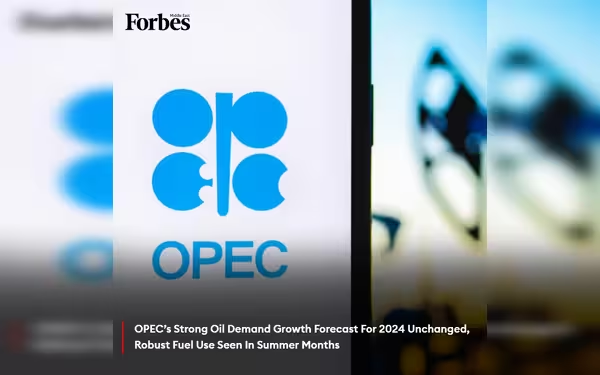Thursday, July 4, 2024 06:00 PM
OPEC Forecasts Strong Oil Demand Growth for Summer Months
- OPEC predicts 2.25 million bpd rise in oil demand for 2024
- Oil prices surge above $90 per barrel due to supply constraints
- OPEC emphasizes monitoring market dynamics for balanced oil market
 Image Credits: X.com
Image Credits: X.comOPEC remains optimistic about global oil demand, projecting significant growth for 2024 and 2025. The organization highlights the impact of economic growth on oil prices and emphasizes the need for vigilance to maintain a balanced market.
The Organization of the Petroleum Exporting Countries (OPEC) has maintained its optimistic outlook on global oil demand, predicting a strong increase in fuel consumption during the upcoming summer months. OPEC's latest monthly report reaffirmed its forecast of a 2.25 million barrels per day rise in oil demand for 2024, followed by a further increase of 1.85 million bpd in 2025.
The report highlighted the potential for enhanced economic growth to provide additional support to oil prices, which have surged above $90 per barrel this year due to supply constraints and geopolitical tensions in the Middle East. OPEC and its allies, collectively known as OPEC+, recently agreed to extend oil output cuts until the end of June, aiming to stabilize the market.
Despite acknowledging some downside risks, OPEC emphasized the possibility of global economic growth outperforming expectations in 2024. The organization will convene in June to assess the need for further output adjustments based on market conditions and demand trends.
In March, OPEC member countries maintained steady oil production levels, reaching 26.60 million bpd, despite the voluntary output reductions implemented by OPEC+ at the beginning of the year.
Looking ahead, OPEC stressed the importance of closely monitoring market dynamics, particularly during the summer period, to ensure a balanced and sustainable oil market. The report underlined the need for vigilance amid ongoing uncertainties to prevent supply-demand imbalances.













